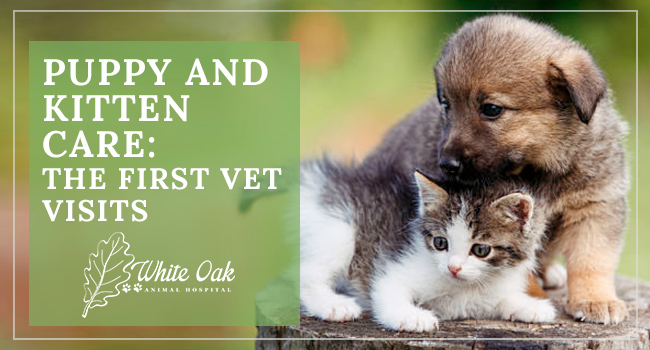All About Puppy & Kitten Vaccines
It’s time for a trip to the vet for vaccines.
So, it’s happened. The question you have dodged for months from your kids has finally become a reality.
“Mom… Dad… please?! I promise I’ll take care of it!”
Now, a little fluff ball of attitude and cuteness has made himself the newest member of the family.
You’ve finally got a routine down on potty training and you are well-prepared for those needle teeth with your bottle of no-chew spray.
But what about the vet visits? When do puppies and kittens begin getting vaccines and for how long? Does your little bundle of joy have intestinal worms? What type of flea prevention can be used at this age?
Thank goodness your veterinarian can answer all of these questions!
The Standard Schedule for Puppy & Kitten Shots
Typically vaccines begin at 6 weeks of age for kittens and puppies alike. Up to 6 weeks of age, they are protected by passive immunity from their mother. Some vaccines must be boosted every 2-4 weeks. Vaccines given before or after the 2-4 week period are considered ineffective.
Vaccine recommendations vary among veterinarians and are usually based on the epidemic of the disease in their area. Listed in the table below are the core vaccines and our recommended schedule for vaccinating.
| Age | Puppies | Kittens |
| 6 weeks | DAPP | FVRCP |
| 9 weeks | DAPP | FVRCP |
| 12 weeks | DAPP | FVRCP, FeLV |
| 15 weeks | DAPP, Rabies, and Bordetella | FVRCP, FeLV, Rabies |
All About The Different Vaccines
DAPP is a combination vaccine for dogs used to help protect against the following:
- Distemper: Disease caused by virus; affects gastrointestinal, nervous and respiratory systems; no known cure
- Adenovirus II: Vaccine protects against canine infectious hepatitis and helps protect against infectious tracheobronchitis (a.k.a. kennel cough)
- Parainfluenza: Highly contagious virus affecting respiratory system; vaccine protects against infectious tracheobronchitis (a.k.a. kennel cough)
- Parvovirus: Highly contagious virus affecting the gastrointestinal system; no known cure.
Bordetella: Helps protect against bacteria that cause infectious tracheobronchitis (a.k.a. kennel cough)
FVRCP is a combination vaccine for cats used to help protect against the following:
- Rhinotracheitis: Disease caused by herpesvirus-1 which affects the respiratory system and reproductive tract
- Calicivirus: Virus affecting the upper respiratory tract
- Panleukopenia: Caused by a virus that results in severe infection; affects gastrointestinal, nervous and immune systems; highly contagious; also called feline parvovirus.
FeLV: A vaccine that protects against feline leukemia. Feline leukemia is a retrovirus and is fatal. There is no known cure.
Rabies: The rabies vaccine prevents rabies, which is a fatal virus affecting the central nervous system. Rabies can transmit to humans and there is no known cure. It is required for all pets by law.
There are other vaccines available, such as leptospirosis and canine influenza. However, vets consider the other vaccines optional. So, they are not part of the core vaccine schedule.
Discuss the different types of vaccines with your veterinarian. Needs vary based on the area you live in and the lifestyle of your pet.
“All I Need Are The Vaccines”
NOOOO!
A visit with the vet should definitely be at the top of your to-do list after acquiring your new pet. Other than vaccines, a physical exam from the veterinarian is important to ensure he/she is developing normally. Things such as heart murmurs can be detected at this early age.
Not to mention those nasty intestinal worms (roundworms and hookworms to name a few). Some of these worms can infect humans. Therefore, it’s very important for you to have your puppy checked multiple times. We actually recommend testing their stool at each puppy/kitten visit.
Why multiple times?
Eggs from intestinal worms are shed in the stool, which are what we see when we look at a sample under the microscope. However, the female may not deposit eggs into the feces 24/7. Also, every type of worm has a different life cycle. Therefore, it is important to check multiple times to make sure your pet is safe!
To Conclude
Aside from promoting good health for your new puppy or kitten, establishing a good relationship with your veterinarian from the get-go is always a good practice.
When the inevitable happens and Lucy eats the entire Thanksgiving turkey off the table when no one is looking, you are going to want your veterinarian there to help.
And who better than the veterinarian who has seen her since she was just a little fur ball?
Questions or thoughts about first-time visits to the vet with your puppy/kitten? Comment below! We’d love to hear your thoughts.
Related Posts
-
When Should I Spay or Neuter My Pet?
Should I Spay or Neuter My Pet? For many years, veterinarians recommended clients spay or…
-
What Every Pet Owner Should Know About Pet Allergies
Whether human or pet, allergies usually prove to be a complicated, and sometimes frustrating, topic.…
-
Managing Pet Dental Needs at Home
Looking for ways to manage your pet dental care needs at home? While we…
-
Are Dental Cleanings for Pets Necessary?
I can usually count on it at least once a week. I follow the…









